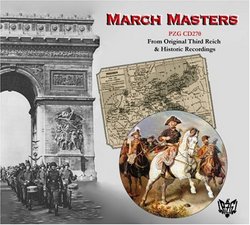Honors Military Musical Heritage
Marc Roland | 03/29/2007
(5 out of 5 stars)
"Every Western nation honors its military musical heritage. America has its Souza marches, and Britain celebrates its annual Edinburgh tattoo. Less well known outside Central Europe is die Grosser Zapfenstreich ("the Great Beat"), a military ceremony performed in Germany and Austria for more than three centuries. Its earliest known reference occurred in a Prussian Army training manual of 1596, but was generally known many years before publication.
Die Grosser Zapfenstreich was described in detail for the first time by Hans von Fleming, a Saxon major, in his 1726 book, Der vollendete deutsche Soldat ("The Perfect German Soldier"). "The Great Beat" originated as an evening concert of popular melodies for soldiers as entertainment at the end of a hard day's work or fighting. Over time, new marches were added, but some of the oldest ones were never deleted. Prussia's King Friedrich Wilhelm III had its repertoire formally arranged in 1813 to include the presentation of arms and a non-denominational prayer, the first non-German music in die Grosser Zapfenstreich. He had been so moved by the Russian choral anthem, "I pray to the power of Love", by Dimitri Bortnjansky (1751-1825), that he ordered its inclusion, and it has remained ever since.
With the proliferation of great military musical composition throughout the 19th Century, many new martial airs crowded into the repertoire. To standardize performances, Friedrich William Wieprecht, director of die Preussischer Wach Musikkorps ("the Prussian Guards' Music Corps"), selected and skillfully wove together a harmonious variety of new and traditional marches, anthems, and fanfares to form a final basis for "The Great Beat". Its debut in honor of a state visit by Russian Czar Nicholas I to Berlin on12 May 1838 transformed die Grosser Zapfenstreich from casual evening entertainment into Germany's highest tribute. Wieprecht's version endured unchanged for the next thirty three years, when the "Netherlands Hymn of Thanksgiving", by Adriaen Valerius, was added after the victory over France, in 1871.
Beginning in 1922, one stanza of the national anthem, das Deutchlandlied, concluded each performance. Die Grosser Zapfenstreich went unaltered throughout the Third Reich, but was banned by the occupation authorities after World War Two. It was reinstituted in 1962 by the East German Communists in an effort to arouse patriotic support for their "Democratic Republic". But substitution of half the traditional music with Marxist propaganda pieces and replacement of das Deutschlandlied with "For the Peace of the World", by the Jewish Soviet composer, Dimitri Shostakovich, failed to emotionally compensate for the Berlin Wall. Prior to this mangled revival across the wire, West German authorities "decriminalized" die Grosser Zapfenstreich, minus the national anthem.
Despite its broad and enduring popularity ever since, numerous "German" politicians continue to agitate for its abolition. Among its most vocal detractors is Socialist Party spokesman, Hans Koschnick, who denounces the "Great Beat" as "pre-democratic", "obsolete", and "a lingering embarrassment in the face of other peoples". During 1996, his SPD joined forces with the "Party of Democratic Socialism", and the better-known "Green Party" to outlaw die Grosser Zapfenstreich. When their attempt narrowly failed to carry a majority vote in the Bundestag, they sought a compromise by calling for removal the Russian and Dutch hymns from the ceremonial concert. Since then, 21st Century efforts to "re-criminalize" the old music have gathered political strength, especially in view of Germany's burgeoning immigrant populations with their political representatives in the German government, and observers believe abolition of die Grosser Zapfenstreich is only a matter of time. If so, then the recordings featured on March Masters may soon become rare collectors' items.
When listening to them, audiences should understand that the Grosser Zapfenstreich experience was not exclusively musical. It involved a military band, a pair of honor guards, and a formation of torch-bearers. The event begins when the troop commander marches up to the person to be honored, formally addresses him, then orders the concert to begin with the Serenade. As such, the "Great Beat" is pomp and ceremony at its most elegant and dramatic. Side One of Marsch-Musik Non-Stop is listed as "Historisches Marsch-Potpourri", but its first part is entirely Zapfenstreich, melded to a variety of related marches, performed by the Grosses Blasorchester, Carl Woitschach conducting. He was an outstanding Kapellmeister from the early 1930s to the late 1950s, when this performance, among the finest ever recorded, was made.
Particularly interesting (and authentic) is an unexpectedly clear recording from 1898 of the Fehrbelliner Reitermarsch (cavalry).
In the final selection of March Masters, the Wachbatallion Berlin features the spoken orders heard in die Grosser Zapfenstreich, the heirloom of another time that has nonetheless lost none of its power to impress.
- Marc Roland"


 Track Listings (5) - Disc #1
Track Listings (5) - Disc #1